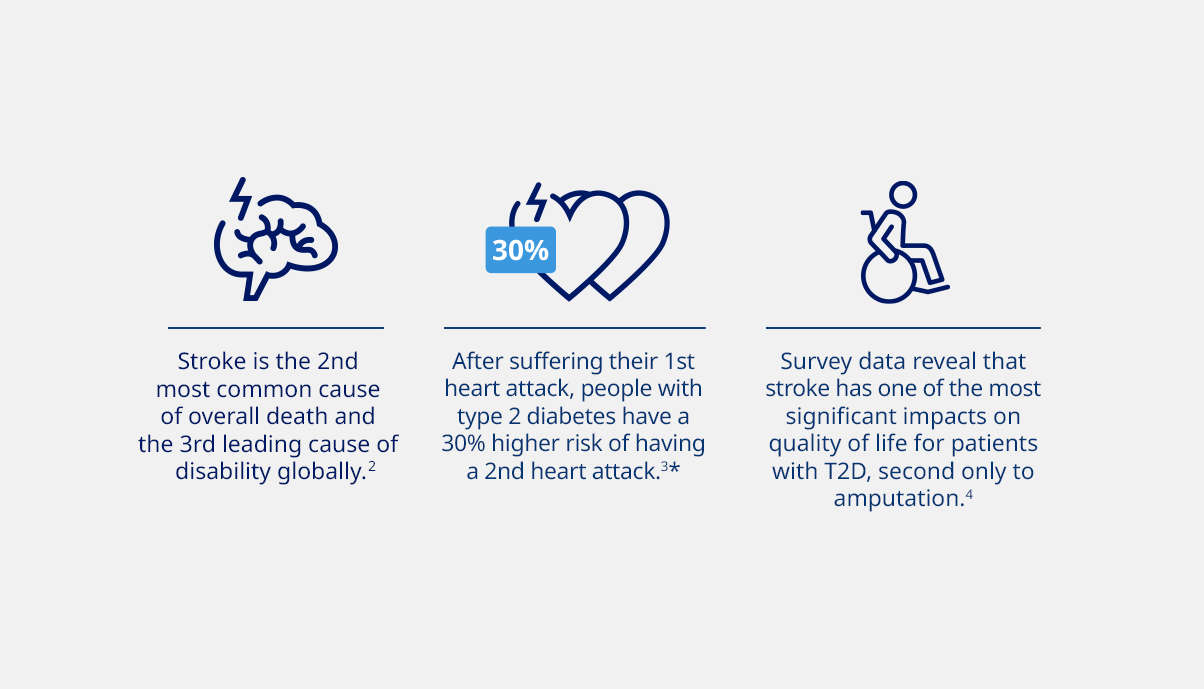

Adults with diabetes are approximately 2x more likely to have coronary heart disease or stroke as those without1

Complications following stroke and heart attack are more severe in patients with diabetes.
- Poststroke disability can encompass a range of physical, emotional and cognitive conditions, such as paralysis, depression and memory loss5
- Brain damage may be more severe and widespread if hyperglycaemia is present when a stroke occurs6
- Increased risk for subsequent strokes, greater functional disability, longer in-hospital stay and increased mortality compared with stroke patients without diabetes7 ______________________________________________________________
- Following a heart attack, patients with diabetes have higher rates of death and disability than those without diabetes8
- Heart attack survivors are affected by9:
○ pain/discomfort
○ anxiety/depression
○ difficulty performing usual activities
Stroke affect more than just patients. Caring for a loved one after a stroke can be overwhelming. Caregivers, typically a spouse or partner, face multiple demands from other aspects of their lives and may have their own health problems. 10
Sarwar N, Gao P, Kondapally Seshasai SR, et al; Emerging Risk Factors Collaboration. Diabetes mellitus, fasting blood glucose concentration, and risk of vascular disease: a collaborative meta-analysis of 102 prospective studies. Lancet. 2010;375(9733):2215-2222. doi:10.1016/S0140-6736(10)60484-9
Feigen VL, Norrving B, Mensah GA. Global burden of stroke. Circ Res. 2017;120(3):439-448.
Liang H, Vallarino C, Joseph G, et al. Increased risk of subsequent myocardial infarction in patients with type 2 diabetes: a retrospective cohort study using the U.K. general practice research database. Diabetes Care. 2014;37(5):1329-1337.
Hayes A, Arima H, Woodward M, et al. Changes in quality of life associated with complications of diabetes: results from the ADVANCE Study. Value Health. 2016;19(1):36-41.
Miller EL, Murray L, Richards L, et al. Comprehensive overview of nursing interdisciplinary rehabilitation care of the stroke patient. American Heart Association Scientific Statement. Stroke. 2010;41(10):2402-2448.
Zhang Z, Yan J, Shi H. Hyperglycemia as a risk factor of ischemic stroke. J Drug Metab Toxicol. 2014;4(4):153.
Tun NN, Arunagirinathan G, Munshi SK, Pappachan JM. Diabetes mellitus and stroke: a clinical update. World J Diabetes. 2017;8(6):235-248.
Leon BM, Maddox TM. Diabetes and cardiovascular disease: epidemiology, biological mechanisms, treatment recommendations and future research. World J Diabetes. 2015;6(13):1246-1258.
Schweickert B, Hunger M, Meisinger C, et al. Quality of life several years after myocardial infarction: comparing the MONICA/KORA registry to the general population. Eur Heart J. 2009;30(4):436-443.
Nelson MM, Smith MA, Martinson BC, Kind A, Luepker RV. Declining patient functioning and caregiver burden/health: the Minnesota stroke survey—quality of life after stroke study. Gerontologist. 2008;48(5):573-583.